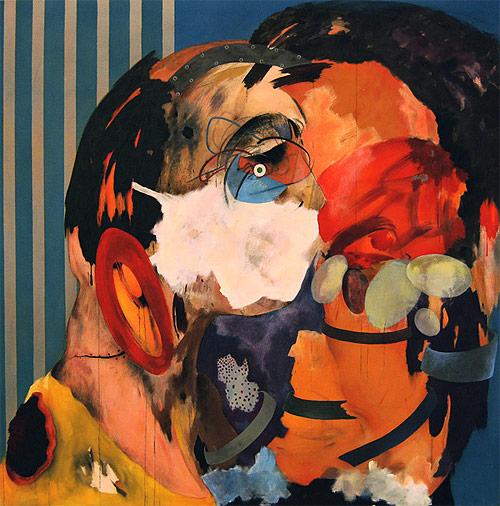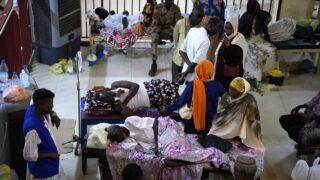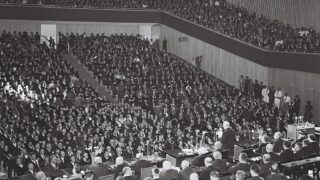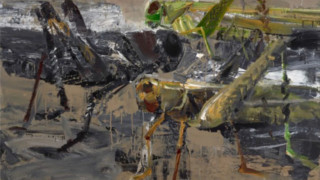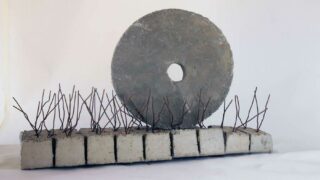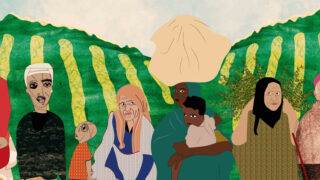The following studies seek to examine corruption in Algeria and Iraq. They do not tackle its manifestation as bribes or looted public funds, but rather as a major governance mechanism, an essential part of its structure and operations.
Corruption is no self-treatable symptom; it cannot cure itself nor can its tailored arrangements; rather, it is channelled to empower a ruler(s), to sustain and perpetuate their power and hegemony. It could be more effective than oppression; takes on various shapes and forms; attacks society by taming it into submission, talks people out of pursuing change, and impoverishes them.
Corruption infests everything and partners with many people to various extents. Alternately, it asks for their complicity, or their acceptance thereof, at the very least, to simplify their lives. It remunerates certain social strata in particular, which happen to be fused with the ruling powers, for matching ideological considerations at times, and tribal-sectarian affiliations at others.
Numerous studies tackle corruption as a question indicative of imprudent governance, lack of transparency, collapsed mechanisms of oversight and accountability, or faded rule of law. The question of corruption has been widely contextualised in theory and through international standards outlined by organisations like the World Bank, the International Monetary Fund, and Transparency International. Those focused on nepotism, theft, and lining influential people’s pockets; they proposed measures to protect whistle blowers, enhanced access to information, made way for civil society, and instilled social accountability; all of which have contributed to the creation of an extensive useful database.
But to focus on those alone would be limiting, as they capture neither dynamics nor functions of corruption. Certainly, all such aspects of corruption must be interconnected somehow, given meaning and rendered a real “configuration”. The studies presented here precisely seek to examine such hypothesis and identify the circumstances that make corruption flourish.
There is, of course, a direct relationship between rampant corruption and failed national liberation –or its defeat– for getting rid of older colonialism is no complete realisation of that end – liberation. Massive privatisations also accompanied such failure and opened up new doors for corruption.
Furthermore, real decision-making mechanisms may be seen hiding behind decision-making formalities, whether in ministerial cabinets or parliamentary buildings. Interchangeably, it hides behind decrees. Namely, corrupt practices take legal cover.
In his paper on Algeria, “Corruption as a Configuration of Power,” Daho Djerbal (1) argues that corruption is deemed institutionalised not only when widespread, but also when organised on the basis of socio-economic clientelist networks entrenched within the State apparatus, then disseminated into society through alternating intermediaries. It emerged fiercest, he says, when the State monopolised economy – in both capitalist and socialist paradigms.
Corruption is a configuration of economic rent which began as a system of economic and political regulation, whereby relations between State and its institutions, enterprises and their partners, civil society and its organisations, are all subject, by hook or crook, to rent-seeking logic instated to allocate all national resources (human, natural, financial, technical, and organisational), develop them, and distribute their generated revenues. Corruption thus became a “rite of passage” to accessing numerous public services.
As for decrees, Djerbal considers them as means for elected assemblies and democratically appointed authorities to avoid discussing major topics at hand. Those are tools invented to ensure wider reproduction of this system of new profits, to render the executive branch as sole party in charge of economic evaluation, and to arbitrage between conflicted interests for the sake of increasing revenues and systematise their redistribution. He also considers corruption and democracy as interlinked. As such, the emergence of “pragmatic practices” assumed by the authorities rely on a system of “remunerations, gift exchange, the fragmentation of spheres, places, and actors who determine what is legal and illegal, moral and immoral, legitimate and illegitimate…”
To illustrate his reflections, he gives a number of real-life examples from Algeria and analyses exposed “scandals”, the logic behind their trials, and the verdicts reached against their protagonists.
In investigating corruption in Algeria, Rachid Sidi Boumedine (2) wonders about what could be defined as corruption. He notes that one culturally distinguishes between corruption and bribes, commonly called “tchippa” or “qahwa,” that is, money ordinary citizens pay to buy access to services (mundane, occasionally) or any other goods, though already granted by virtue of law.
One feature of a clientelist system is embodied in excessive authorised violations, starting from the highest ranks of the hierarchy, which simultaneously places the lower ranks at the mercy of executive circles, who could, in turn, punish the former for violation of the written law, if there need be.
Boumedine also notes how rentier networks function “internally”, like a clan (a family, village, affiliated community). As such, familiar arrangements of gift-exchange and mutual donations -characterised by their binding and impactful nature- create a favoured system of rights and obligations in society. Such principles consolidate a clientelist system by creating, nourishing, and sustaining reciprocal obligations among its members. He also claims that the system in Algeria has become neo-patrimonial.
This configuration of looting and corruption thus draws upon social acceptance for sustenance. As such, at least in part, it is not considered as theft carried out at the expense of the larger public.
Such ideological design –which legitimises looting, whereby the latter is an act directed against an anonymous, undefined, long-hated state after all– thus becomes a gateway to a new social paradigm. He illustrates the question through describing those recurring handouts to the “poor”, or housing opportunities delivered in accordance with ever-contested lists – fashioned along surreptitious criteria. These operations further plunge their beneficiaries into that recognised mire of a clearly unjust system. It is a system that benefits whoever knows their way around maintaining good relations with network agents, ensuring access to those lists.
In their cowritten article reviewed by writer Omar Aljaffal (3), researchers Mohsin Ahmad Ali (4) and Abdul Rahman Al-Mashhadani (5) consider how the 2003 US occupation of Iraq –which toppled the political regime, dismantled the foundations of the state, reformulating them in accordance with US visions and under the administration of the “American civil governor of Iraq”, Paul Bremer– resulted in the transformation of corruption from a manageable and resistible phenomenon into a system protected by laws and legislations. It was thus turned into a daily practice protected by force of weapons, media, platforms, and religious fatwas.
The writers see the destruction of the public sector in the monopolisation of secure jobs by the ruling power and its parties. Those jobs are thus used as a card to purchase voter power in parliamentarian elections, whereby parties promise their supporters and clans jobs in return for their electoral vote. Subsequently, the number of government employees would reach 4.5 million, as opposed to 880 thousand employees in 2003. The two researchers claim that corruption developed and transformed into an “acceptable” social phenomenon after 2003, accompanied by a political shift towards a market economy led by political parties that landed with the occupier and/or emerged after 2003. Those parties have sectarian and racist agendas. Those parties ratified regulations and laws that furthered their interests, such as the “Jihad military service” – for people who had established organisations of armed resistance against Saddam Hussein’s regime and for “political prisoners”. As such, we do not stand before one type of corruption only (which manifests in bribery, among other illegal activity), but also before corruption protected by a legal framework that includes a larger range of different economic activities, subsequently rendering the country’s riches into material up for grabs to those in power and control, inside and outside Iraq. Between 2003 and 2018, financial crimes hit unprecedented records while financial waste surpassed $350 billion. The two researchers also affirm a close connection between intensified and aggravated corruption and external factors that instigate and encourage it. Many cases of corruption are thus entwined with external objectives abroad. Their article tackles manifestations of corruption throughout Iraq and its sectors, as well as those tools used by the ruling power to perpetuate its rule and those it uses to appease society.
Overall, research on corruption faces various challenges, some of which are obstructive indeed. Those include lack of published data, prohibited access to documents, lack of documentation in the first place, mistrust in researchers, and the potential harm that threatens the latter should their research be published. Additionally, research faces challenges that pertain to researchers themselves, from sticking to one familiar methodology they are prone to reproduce, to the scarcity of institutions capable of embracing and supporting them, or lack thereof, to competing over whatever little is available, all the way to declining intellectual standards and knowledge in general, and so on.
Ultimately, the endeavour we undertake here goes with an unexhausted obsession with searching and trying. It questions the way existing powers rule our countries. Along with the contributing researchers, Assafir Al-Arabi thus hopes to have tackled some of the aspects that could answer such a fundamental question.
****
Translated from Arabic by Yasmine el Haj
The first edition of “Assafir al Arabi Books” is downloadable here in PDF
1- Daho Djerbal is a historian. He teaches contemporary history at the University of Algiers 2. Besides his extensive research on economic and social history, he studies the relationship between history and memory. He has been the director of Naqd publication, a review of social studies and critique, since 1993.
2- Rachid Sidi Boumedine is both scientist and sociologist. He published a number of books and articles throughout his career as academic and consultant in both Algeria and abroad.
3- Iraqi poet and writer. He recently worked on a project that analysed Basrah’s local government in Iraq, as part of a “conflict resolution studies program” at the London School of Economics and Political Science (LSE). He received the Mostafa Husseini Prize for young journalists in 2017.
4- Professor of political economy at the University of Basrah.
5- Senior lecturer at Al Iraqia University, specialised in international economic relations.

